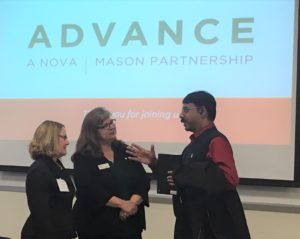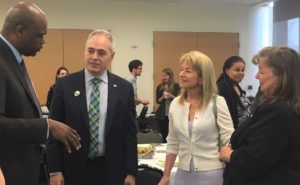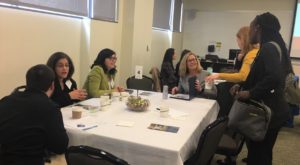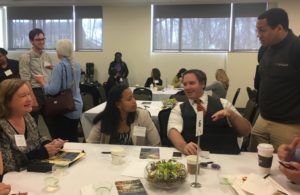 While George Mason University produces hundreds of candidates each year in the field of education, academic leaders at Mason recognized the need to work closely with area educational institutions – both public and private – to ensure that those candidates meet and surpass the expectations in today’s educational environment.
While George Mason University produces hundreds of candidates each year in the field of education, academic leaders at Mason recognized the need to work closely with area educational institutions – both public and private – to ensure that those candidates meet and surpass the expectations in today’s educational environment.
 To do so, armed with a grant from the Association of Public and Land Grant Universities (APLU), Mason recently held a roundtable of academic leaders as well as a host of representatives from private and public schools from the greater Washington, DC area to look closely at the needs of area teaching institutions. The event also prominently included educators and faculty from Northern Virginia Community College (NOVA), Mason’s community college partner in the ADVANCE program, a nationally recognized program which supports the seamless transfer of students from the two-year school to Mason.
To do so, armed with a grant from the Association of Public and Land Grant Universities (APLU), Mason recently held a roundtable of academic leaders as well as a host of representatives from private and public schools from the greater Washington, DC area to look closely at the needs of area teaching institutions. The event also prominently included educators and faculty from Northern Virginia Community College (NOVA), Mason’s community college partner in the ADVANCE program, a nationally recognized program which supports the seamless transfer of students from the two-year school to Mason.
The roundtable included presentations and focused examinations of various aspects of the educational curriculum, as well as breakout sessions that delved directly into the qualifications of the ideal teacher. The roundtable host, Mason’s Associate Provost for Academic Iniatives and Services Janette Muir, noted, “It’s time to talk about education in a more organized way.” Specific goals for the day included future job demands, student preparation, knowledge gaps and work based experiential learning. Muir told the assembled audience, “Today, we need to learn from you.”
Participants then rolled up their sleeves and dissected a variety of elements and experiences that representatives identified as critical for  successful teachers. Not surprisingly, many groups arrived at the same conclusions, including the need for significant ‘ground level’ experience with groups of students, providing background for how to handle classroom situations; the ability to work in a team environment; and the ‘soft skills’ necessary to handle a variety of audiences — students, fellow teachers and parents.
successful teachers. Not surprisingly, many groups arrived at the same conclusions, including the need for significant ‘ground level’ experience with groups of students, providing background for how to handle classroom situations; the ability to work in a team environment; and the ‘soft skills’ necessary to handle a variety of audiences — students, fellow teachers and parents.
Attendee Zachary Shelton, Director of STEM exCel which offers STEM classes and programs said, “The best programmer is not necessarily the best instructor. Very important: They need to have classroom and behavior management skills.” Shelton then reflected on the roundtable meeting, “I’m inspired by the Education focus here, though. You are having this meeting and you want to listen.”
 At the conclusion of the event, each table shared their findings with the room and a list of targeted skill sets were noted. Muir recalled the energy and environment throughout the day, “We were able to connect a group of passionate, motivated leaders in education – they were enthusiastic about the idea of building better teachers and I know we’ve begun to construct stronger pathways for our students from NOVA to Mason and beyond.”
At the conclusion of the event, each table shared their findings with the room and a list of targeted skill sets were noted. Muir recalled the energy and environment throughout the day, “We were able to connect a group of passionate, motivated leaders in education – they were enthusiastic about the idea of building better teachers and I know we’ve begun to construct stronger pathways for our students from NOVA to Mason and beyond.”

